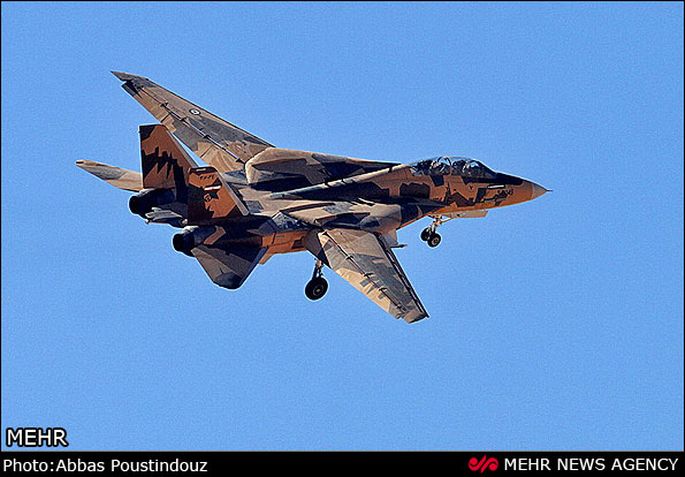You are using an out of date browser. It may not display this or other websites correctly.
You should upgrade or use an alternative browser.
You should upgrade or use an alternative browser.
Iranian Military News, Reports, Data, etc.
- Thread starter ShahryarHedayat
- Start date
ShahryarHedayat
Junior Member
The Russian, Iranian, Hezbollah military triangle

Lebanon's Hezbollah members stand at attention in front of a picture of Hassan al-Haj, one of Hezbollah's top commanders who was killed fighting alongside Syrian army forces in Idlib province, during his funeral in his hometown of al-Luwaizeh, southern Lebanon, Oct. 12, 2015. (photo by REUTERS/Ali Hashisho)
Since Hezbollah’s intervention in Syria became apparent in the summer of 2012, it has been a subject of hot debate both within Lebanon and beyond. Many questioned the wisdom of this step, saying that by engaging in the Syrian conflict, Hezbollah had tarnished its image after gaining high popularity in the Arab world as an anti-Israeli resistance force.
But with the latest twist of events sparked by the Russian intervention in Syria, which started Sept. 30, the Lebanese movement may very well be in the driver's seat to assume a major regional role. This could mean the birth of a “new Middle East,” albeit in stark contrast to the one then-Secretary of State Condoleezza Rice spoke of shortly after Israel began its war on Lebanon in July 2006 with the aim of “crushing Hezbollah.”
A major indicator supporting the above notion is that Russia does not seem to be replacing the “Iranian-Hezbollah axis” in Syria, but rather complementing and strengthening this axis. According to political commentator with Russia’s Kommersant publishing house Sergei Strokan, there now exists a “Russia, Iran, Hezbollah military triangle” in Syria.
In a telephone interview with Al-Monitor, Strokan said, “Hezbollah can do some things that Russia can’t afford to do itself,” as putting “Russian boots on the ground [in Syria] is a subject of heated debate [within Russia].”
He added, “The Russian public is worried that something similar to Afghanistan might take place.”
Hezbollah for its part appeared jubilant, from day one of the Russian airstrikes. Just hours after the first airstrikes were launched on Sept. 30, a Hezbollah official emphasized during a private discussion with Al-Monitor that Moscow "has its partners on the ground in the Syrian army and its allies, like us."
A second Hezbollah official recently told Al-Monitor about reports of the establishment of a joint operations room in Damascus for the coordination of efforts between Russia, the Syrian army, Iran and Hezbollah. The official, who spoke on condition of anonymity, underscored that the Lebanese movement — and its allies in Syria — were now receiving “support from a superpower, and Hezbollah [along with the Syrian army] was providing intelligence to Moscow in the air raids being conducted.”
An Iranian source, who maintains close contact with both the Russian and Chinese sides, went even further, saying that Hezbollah’s regional patron, Iran, had “brought the Russians [into Syria].” This scenario is further supported by reports that Russian President Vladimir Putin’s military intervention was planned out during a visit by the commander of the Iranian Quds Force, Qasem Soleimani, to Moscow in late July.
Within this same framework, the chief international correspondent of the Al Rai Kuwaiti newspaper, Elijah Magnier, has also reported about a division of labor agreement, whereby Russian warplanes provide air support for the Iranian and Hezbollah fighters on the ground (in addition to Iraqi and Afghan fighters), as they attempt to retake lost Syrian territories.
Meanwhile, director of the military and security studies program at the Washington Institute for Near East Policy, Michael Eisenstadt, as well as former head of Israeli military intelligence Amos Yadlin, have also shed light on the likelihood that the Russian intervention in Syria will only serve to strengthen the position of Hezbollah — and Iran — in that country.
At the same time, Russian experts point out that Moscow’s intervention in Syria is part of a broader strategy in the Middle East, whereby success in Syria could spell success for Putin’s bid to assume a leadership role in the Middle East, a role Putin is widely believed to aspire to.
Strokan said President Putin has placed high stakes on success in Syria and therefore “can’t afford to lose.”
If such a scenario is indeed playing out and the “Russian, Iranian, Hezbollah military triangle” is victorious in Syria, Hezbollah will not only go down as one of the major players that changed the geopolitics of the Middle East, but will also have established itself as a strategic partner in this “new Middle East.”
Ironically, the movement could go from being an organization that was internationally recognized as a terrorist group to an organization that is an “internationally recognized” anti-terrorist force — although such an outcome is far from guaranteed.
The establishment of the joint operations headquarters between Russia and Iran in Iraq to share intelligence in the fight against terror only serves to reinforce the notion that Moscow will seek to expand its regional role through coordination with Iran and Hezbollah.
According to the well-informed Iranian source who asked not to be named, Russia and China "have come to view Iran and Hezbollah [along with the Yemeni Ansar Allah group, which is viewed as the Yemeni version of Hezbollah] as the most effective fighting force against terror.”
Strokan expressed a similar view, underscoring that for Russia, “Hezbollah is getting much more important.” Expanding Russia’s leadership “obviously would require it to maintain close contact and cooperation with influential players in the region,” Strokan said, adding that “Hezbollah’s role is not restricted to Syria.”
Indeed, Hezbollah stands ready to enter into a similar arrangement with Moscow in Iraq. When asked whether the movement was ready to replicate the coordination with Russia on the Iraqi battlefield, the Hezbollah official nodded in approval.
,

Lebanon's Hezbollah members stand at attention in front of a picture of Hassan al-Haj, one of Hezbollah's top commanders who was killed fighting alongside Syrian army forces in Idlib province, during his funeral in his hometown of al-Luwaizeh, southern Lebanon, Oct. 12, 2015. (photo by REUTERS/Ali Hashisho)
Since Hezbollah’s intervention in Syria became apparent in the summer of 2012, it has been a subject of hot debate both within Lebanon and beyond. Many questioned the wisdom of this step, saying that by engaging in the Syrian conflict, Hezbollah had tarnished its image after gaining high popularity in the Arab world as an anti-Israeli resistance force.
But with the latest twist of events sparked by the Russian intervention in Syria, which started Sept. 30, the Lebanese movement may very well be in the driver's seat to assume a major regional role. This could mean the birth of a “new Middle East,” albeit in stark contrast to the one then-Secretary of State Condoleezza Rice spoke of shortly after Israel began its war on Lebanon in July 2006 with the aim of “crushing Hezbollah.”
A major indicator supporting the above notion is that Russia does not seem to be replacing the “Iranian-Hezbollah axis” in Syria, but rather complementing and strengthening this axis. According to political commentator with Russia’s Kommersant publishing house Sergei Strokan, there now exists a “Russia, Iran, Hezbollah military triangle” in Syria.
In a telephone interview with Al-Monitor, Strokan said, “Hezbollah can do some things that Russia can’t afford to do itself,” as putting “Russian boots on the ground [in Syria] is a subject of heated debate [within Russia].”
He added, “The Russian public is worried that something similar to Afghanistan might take place.”
Hezbollah for its part appeared jubilant, from day one of the Russian airstrikes. Just hours after the first airstrikes were launched on Sept. 30, a Hezbollah official emphasized during a private discussion with Al-Monitor that Moscow "has its partners on the ground in the Syrian army and its allies, like us."
A second Hezbollah official recently told Al-Monitor about reports of the establishment of a joint operations room in Damascus for the coordination of efforts between Russia, the Syrian army, Iran and Hezbollah. The official, who spoke on condition of anonymity, underscored that the Lebanese movement — and its allies in Syria — were now receiving “support from a superpower, and Hezbollah [along with the Syrian army] was providing intelligence to Moscow in the air raids being conducted.”
An Iranian source, who maintains close contact with both the Russian and Chinese sides, went even further, saying that Hezbollah’s regional patron, Iran, had “brought the Russians [into Syria].” This scenario is further supported by reports that Russian President Vladimir Putin’s military intervention was planned out during a visit by the commander of the Iranian Quds Force, Qasem Soleimani, to Moscow in late July.
Within this same framework, the chief international correspondent of the Al Rai Kuwaiti newspaper, Elijah Magnier, has also reported about a division of labor agreement, whereby Russian warplanes provide air support for the Iranian and Hezbollah fighters on the ground (in addition to Iraqi and Afghan fighters), as they attempt to retake lost Syrian territories.
Meanwhile, director of the military and security studies program at the Washington Institute for Near East Policy, Michael Eisenstadt, as well as former head of Israeli military intelligence Amos Yadlin, have also shed light on the likelihood that the Russian intervention in Syria will only serve to strengthen the position of Hezbollah — and Iran — in that country.
At the same time, Russian experts point out that Moscow’s intervention in Syria is part of a broader strategy in the Middle East, whereby success in Syria could spell success for Putin’s bid to assume a leadership role in the Middle East, a role Putin is widely believed to aspire to.
Strokan said President Putin has placed high stakes on success in Syria and therefore “can’t afford to lose.”
If such a scenario is indeed playing out and the “Russian, Iranian, Hezbollah military triangle” is victorious in Syria, Hezbollah will not only go down as one of the major players that changed the geopolitics of the Middle East, but will also have established itself as a strategic partner in this “new Middle East.”
Ironically, the movement could go from being an organization that was internationally recognized as a terrorist group to an organization that is an “internationally recognized” anti-terrorist force — although such an outcome is far from guaranteed.
The establishment of the joint operations headquarters between Russia and Iran in Iraq to share intelligence in the fight against terror only serves to reinforce the notion that Moscow will seek to expand its regional role through coordination with Iran and Hezbollah.
According to the well-informed Iranian source who asked not to be named, Russia and China "have come to view Iran and Hezbollah [along with the Yemeni Ansar Allah group, which is viewed as the Yemeni version of Hezbollah] as the most effective fighting force against terror.”
Strokan expressed a similar view, underscoring that for Russia, “Hezbollah is getting much more important.” Expanding Russia’s leadership “obviously would require it to maintain close contact and cooperation with influential players in the region,” Strokan said, adding that “Hezbollah’s role is not restricted to Syria.”
Indeed, Hezbollah stands ready to enter into a similar arrangement with Moscow in Iraq. When asked whether the movement was ready to replicate the coordination with Russia on the Iraqi battlefield, the Hezbollah official nodded in approval.
,
ShahryarHedayat
Junior Member
Iran's electronic warfare achievements significant
Unveiling 16 electronic defense achievements in Shiraz Electronics Industries on Monday, Iran’s defense minister said Iran has achieved outstanding capability to confront enemy’s electronic warfare.
Addressing the unveiling ceremony of 16 new achievements of Iran's Defense Industries in the Southern city of Shiraz on Monday, Brigadier General Hossein Dehghan emphasized Iran's defense capabilities; “With the efforts of experts in Shiraz Electronics Industries, the required equipment for various sectors of armed forces are being produced,” he said, aaserting that the most important achievement is the manufacture of different radars which can identify and track threats and defend the country.
“So far, mass production of different radar systems that can cover a range of objects in distances up to 500 kilometers has been accomplished in Shiraz Electronics Industries,” he noted.
General Dehghan deemed the indigenization of the navigation systems of warplanes as another achievement of Shiraz Electronics Industries; “we have made outstanding advancement in area of software production for confronting enemy’s electronic warfare,” he asserted.
“Jamming, COMINT (Communications Intelligence) and ELINT (Electronic signals intelligence) systems are capable of identifying enemy position in the battleground and Iran's armed forces will be able to take necessary actions towards enemies in a matter of seconds,” added General Dehghan.
Several important defense products were unveiled during the ceremony including a Radar system with the capability of tracking different semi-heavy and heavy weapons as well as taking action during electronic warfare, Ghamar 3-D search and control radar system with the capability of tracking more than 100 targets, including fighter jets and drones, up to a distance of 450 kilometers at different altitudes and transferring the relevant data to the air defense network as well as Absar video-imaging system which can be mounted on fighter jets and drones.
Dehghan also inaugurated the production line of air and airport navigation systems including MLAT (Multilateration), ELINT as well as COMINT systems.
Pic from the new "Ghamar"radar
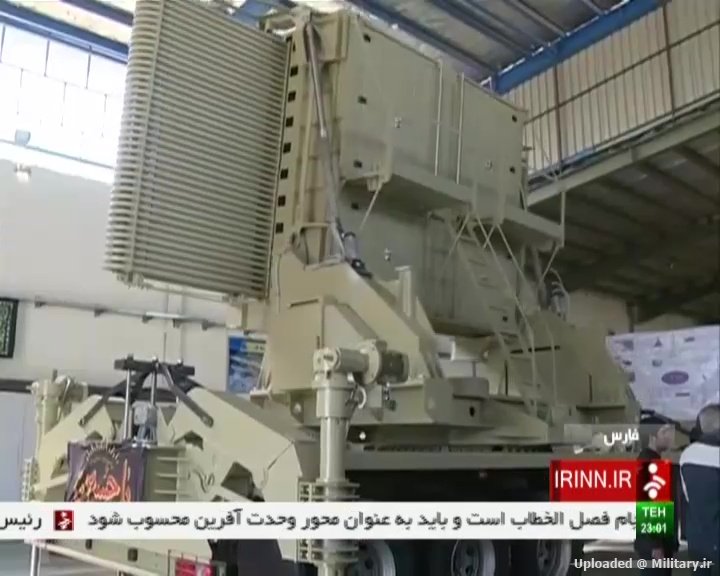
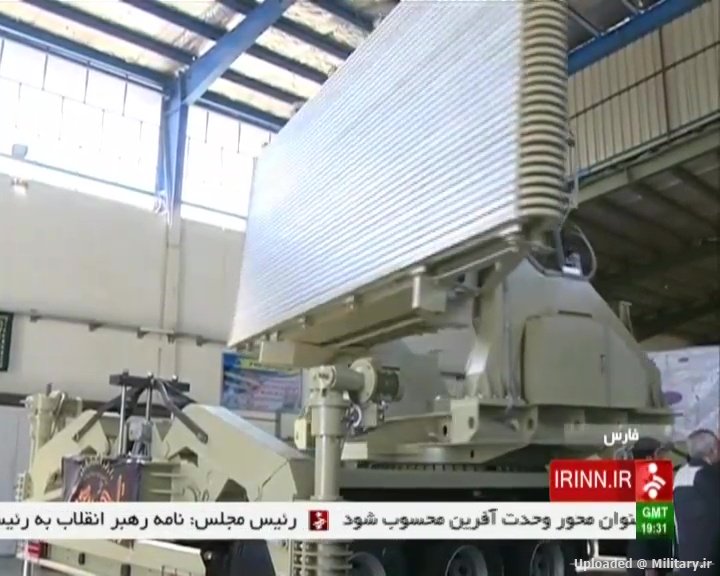
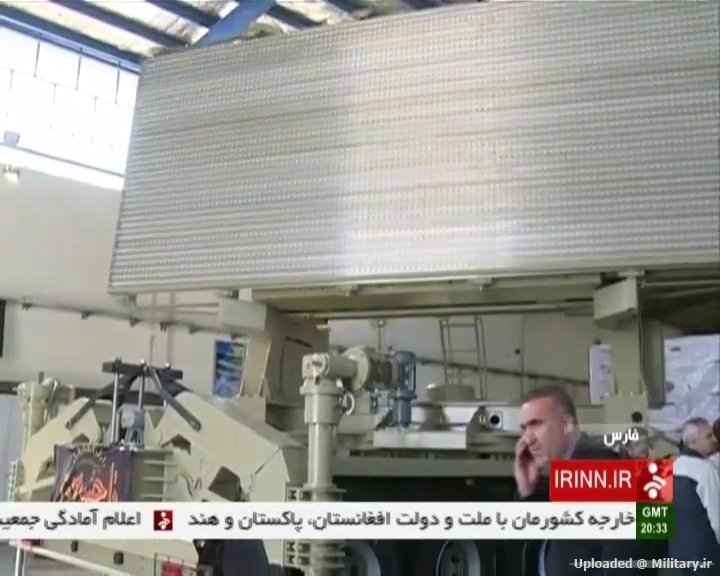
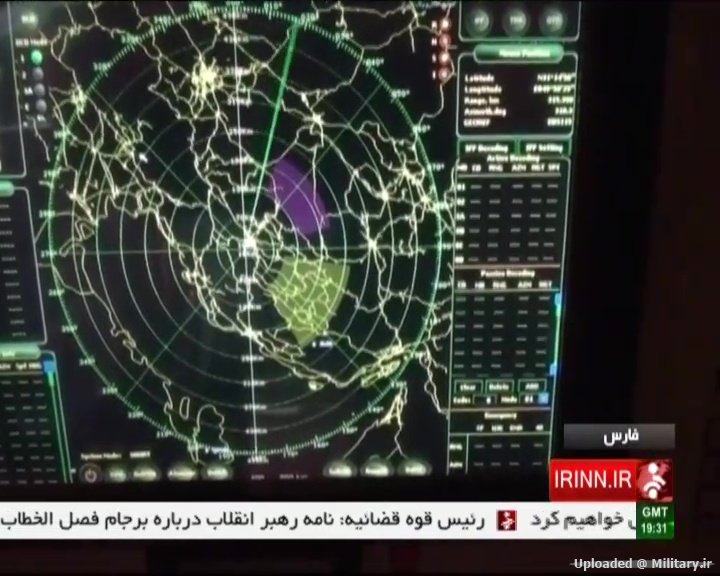
Unveiling 16 electronic defense achievements in Shiraz Electronics Industries on Monday, Iran’s defense minister said Iran has achieved outstanding capability to confront enemy’s electronic warfare.
Addressing the unveiling ceremony of 16 new achievements of Iran's Defense Industries in the Southern city of Shiraz on Monday, Brigadier General Hossein Dehghan emphasized Iran's defense capabilities; “With the efforts of experts in Shiraz Electronics Industries, the required equipment for various sectors of armed forces are being produced,” he said, aaserting that the most important achievement is the manufacture of different radars which can identify and track threats and defend the country.
“So far, mass production of different radar systems that can cover a range of objects in distances up to 500 kilometers has been accomplished in Shiraz Electronics Industries,” he noted.
General Dehghan deemed the indigenization of the navigation systems of warplanes as another achievement of Shiraz Electronics Industries; “we have made outstanding advancement in area of software production for confronting enemy’s electronic warfare,” he asserted.
“Jamming, COMINT (Communications Intelligence) and ELINT (Electronic signals intelligence) systems are capable of identifying enemy position in the battleground and Iran's armed forces will be able to take necessary actions towards enemies in a matter of seconds,” added General Dehghan.
Several important defense products were unveiled during the ceremony including a Radar system with the capability of tracking different semi-heavy and heavy weapons as well as taking action during electronic warfare, Ghamar 3-D search and control radar system with the capability of tracking more than 100 targets, including fighter jets and drones, up to a distance of 450 kilometers at different altitudes and transferring the relevant data to the air defense network as well as Absar video-imaging system which can be mounted on fighter jets and drones.
Dehghan also inaugurated the production line of air and airport navigation systems including MLAT (Multilateration), ELINT as well as COMINT systems.
Pic from the new "Ghamar"radar




ShahryarHedayat
Junior Member
Iran’s Advisory Help for Yemen to Continue: IRGC Chief
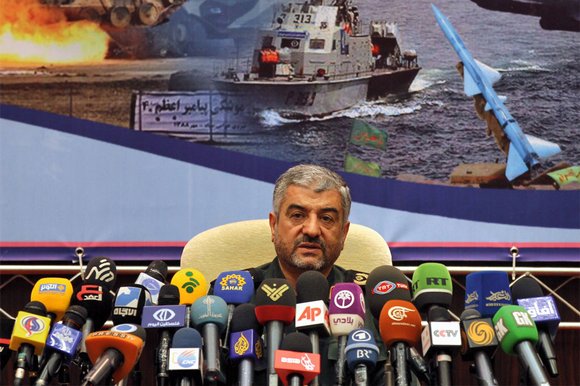
TEHRAN (Tasnim) – Commander of the Islamic Revolution Guards Corps (IRGC) Major General Mohammad Ali Jafari affirmed that Iran will keep providing Yemen’s Ansarullah movement with whatever advisory assistance it may need in the face of Saudi-led invasion.
In an address to the University of Tehran’s students on Monday, the top general said Iran has offered the necessary help for Yemen so far, and will continue to “do whatever it can in the advisory dimension”, because “the Ansarullah (movement) has gained a firm position in Yemen.”
His comments came against the backdrop of more than seven months of airstrikes against Yemen by a Saudi-led military coalition. Saudis and their Arab allies have been targeting the Houthi Ansarullah movement in an attempt to restore power to the fugitive former Yemeni President Abd Rabbuh Mansour Hadi, a close ally of Riyadh.
Elsewhere in his comments, Major General Jafari reiterated Iran’s commitment to offering advisory assistance to the Syrian government and nation.
The general said Iran will keep backing Syrian President Bashar al-Assad, who has stood against Israel.
Lauding the Syrian president’s significant role in the axis of anti-Israeli resistance, the IRGC commander said Iran will agree to Assad's stepping down "only if the Syrian people chose it in elections.”
In comments earlier on Sunday, Supreme Leader of the Islamic Revolution Ayatollah Seyed Ali Khamenei also described the only way out of crisis in Syria as elections.
“The solution to the Syria issue is elections and to that effect, war and unrest should first end with a halt to military and financial aid to the dissidents, so that the Syrian people would elect anyone they want in a safe and calm atmosphere,” Ayatollah Khamenei said.

TEHRAN (Tasnim) – Commander of the Islamic Revolution Guards Corps (IRGC) Major General Mohammad Ali Jafari affirmed that Iran will keep providing Yemen’s Ansarullah movement with whatever advisory assistance it may need in the face of Saudi-led invasion.
In an address to the University of Tehran’s students on Monday, the top general said Iran has offered the necessary help for Yemen so far, and will continue to “do whatever it can in the advisory dimension”, because “the Ansarullah (movement) has gained a firm position in Yemen.”
His comments came against the backdrop of more than seven months of airstrikes against Yemen by a Saudi-led military coalition. Saudis and their Arab allies have been targeting the Houthi Ansarullah movement in an attempt to restore power to the fugitive former Yemeni President Abd Rabbuh Mansour Hadi, a close ally of Riyadh.
Elsewhere in his comments, Major General Jafari reiterated Iran’s commitment to offering advisory assistance to the Syrian government and nation.
The general said Iran will keep backing Syrian President Bashar al-Assad, who has stood against Israel.
Lauding the Syrian president’s significant role in the axis of anti-Israeli resistance, the IRGC commander said Iran will agree to Assad's stepping down "only if the Syrian people chose it in elections.”
In comments earlier on Sunday, Supreme Leader of the Islamic Revolution Ayatollah Seyed Ali Khamenei also described the only way out of crisis in Syria as elections.
“The solution to the Syria issue is elections and to that effect, war and unrest should first end with a halt to military and financial aid to the dissidents, so that the Syrian people would elect anyone they want in a safe and calm atmosphere,” Ayatollah Khamenei said.
ShahryarHedayat
Junior Member
Iran Closing Technology Gap With Israel, Military Intelligence Chief Warns
Haaretz Israeli News Source
The Military Intelligence chief said Israel and Iran are engaged in a technology war in which the Islamic Republic is rapidly narrowing the quality gap.
Maj. Gen. Herzl Halevi, speaking at a closed lecture Thursday, added that if the anxiety generated by the videos of Palestinians stabbing Israelis on social media had existed in 1948, Israel would not have won the War of Independence.
He also revealed that recently, MI abandoned an operation at the last minute because of a letter the corps received from a low-ranking officer in its 8200 signals intelligence unit.
Halevi was speaking to a few dozen donors and faculty members of the College of Management at the Rothchild Bank in Tel Aviv. It was an uncharacteristic appearance for Halevi, who in the year since he succeeded Aviv Kochavi has maintained a low profile.
The general did not give a detailed intelligence assessment but delivered remarks that had never been made in public by a top officer in the Israel Defense Forces.
“If you ask me whether we’ll have a war with Iran over the next 10 years, I’ll give you a surprising answer: We are already at war with Iran,” Halevi said. “We’re having a technological war with Iran. Our engineers are fighting Iranian engineers, today, and it’s becoming increasingly significant.”
The war, he said, was over intelligence, weapons and military capabilities, and Halevi was pessimistic. “Today we have the advantage. Iran is closing in on it. Since the 1979 revolution, the number of universities and university students in Iran has increased twentyfold, compared with three and a half times for Israel,” Halevi said, adding that enrollment in science, technology, engineering and math in Iran was skyrocketing.
Halevi touched on the current wave of terror attacks and the difference between the country’s past wars, conducted mainly in border areas, and today’s wars, in which the home front suffers many casualties.
“The next war will be much worse for the home front,” Halevi said. “In the Yom Kippur War there was one home-front casualty; a FROG missile struck the pilots’ quarters of the Ramat David air base. It was the only casualty on the home front. All the rest were military.”
He said a main issue in today’s wars was awareness. “It’s not about how many you killed and how many the other side killed, and it’s not about how far you got and where you planted your flag. It’s about the story that the war tells,” he said.
“All of us, including me and each of you, have for the past month been brainwashing ourselves when we watch those stabbing videos over and over, creating a level of anxiety that, had everyone in the War of Independence been watching the videos of Latrun, San Simon or Nitzanim, it’s not sure we would have been able to keep going.”
Halevi said it was much harder for MI to develop and retain intelligence sources today than a decade or two ago due to rapid technological change. “The same kilogram of intelligence costs much more than it did 10 years ago. Not only does it cost more, its expiration date is significantly sooner,” he said.
“Twenty years ago you had an intelligence accomplishment and you were set for the next five to seven years. Today you might have worked really hard, risking people’s lives, carrying out all sorts of maneuvers. You got something, but with the speed at which our world operates and the speed at which technology changes,” the expiry time declines.
To illustrate this point, the MI chief described efforts to collect intelligence about the Islamic State. He encouraged his audience to not be fooled by the dreadlocks and traditional robes of ISIS operatives. “They use the most cutting-edge technology,” he said. “It’s not carrier pigeons, it’s the most advanced communication systems, with the best encryption on top of that. It changes every couple of days.”
He said MI’s organizational culture was such that even soldiers and junior officers could have great influence. “We faced a dilemma over whether to carry out a particular operation in a particular place. It was about to go up to the chief of staff for a decision, and we needed to decide whether to do it or not,” he said.
“An officer enters my office and says, ‘Listen, I want you to read this, it’s a letter from a first lieutenant, a network intelligence officer at a Unit 8200 base.’ He’s a first lieutenant. He writes a letter to the Unit 8200 commander and to the head of MI: ‘Listen, I think you’re making a mistake,’” Halevi said.
“It's just five minutes before decision time. I might not have read the letter if it arrived one minute later, before the talk with the chief of staff. That’s the ability of people to make an impact at the most critical second of decision-making.”
Halevi defended the standing army against recent criticism about the size of the defense budget. “There’s a bit of an atmosphere in the country today — maybe you don’t think so — but the officers feel that’s it not so positive toward the army,” he said.
“I think this is dangerous. I think it comes a bit from the place of the budget. Officers tell me strangers sometimes stop them on the street saying we’re the problem of the Israeli economy. I’d be cautious. It’s better that the best people are involved — in security in general and intelligence in particular.”
Halevi said he even feared the elimination of mandatory military service in Israel. “The quiet depends on our being strong, and my fear is that we will end the model of a people’s army, and then the IDF won’t accept all of Israeli youth into its ranks and won’t take advantage of the best people,” he said.
“If we change the model of the people’s army, then in the first two or three years inertia will keep us going, but after that the entire defense establishment will be damaged to the point of damage to the state’s security.”
Haaretz Israeli News Source
The Military Intelligence chief said Israel and Iran are engaged in a technology war in which the Islamic Republic is rapidly narrowing the quality gap.
Maj. Gen. Herzl Halevi, speaking at a closed lecture Thursday, added that if the anxiety generated by the videos of Palestinians stabbing Israelis on social media had existed in 1948, Israel would not have won the War of Independence.
He also revealed that recently, MI abandoned an operation at the last minute because of a letter the corps received from a low-ranking officer in its 8200 signals intelligence unit.
Halevi was speaking to a few dozen donors and faculty members of the College of Management at the Rothchild Bank in Tel Aviv. It was an uncharacteristic appearance for Halevi, who in the year since he succeeded Aviv Kochavi has maintained a low profile.
The general did not give a detailed intelligence assessment but delivered remarks that had never been made in public by a top officer in the Israel Defense Forces.
“If you ask me whether we’ll have a war with Iran over the next 10 years, I’ll give you a surprising answer: We are already at war with Iran,” Halevi said. “We’re having a technological war with Iran. Our engineers are fighting Iranian engineers, today, and it’s becoming increasingly significant.”
The war, he said, was over intelligence, weapons and military capabilities, and Halevi was pessimistic. “Today we have the advantage. Iran is closing in on it. Since the 1979 revolution, the number of universities and university students in Iran has increased twentyfold, compared with three and a half times for Israel,” Halevi said, adding that enrollment in science, technology, engineering and math in Iran was skyrocketing.
Halevi touched on the current wave of terror attacks and the difference between the country’s past wars, conducted mainly in border areas, and today’s wars, in which the home front suffers many casualties.
“The next war will be much worse for the home front,” Halevi said. “In the Yom Kippur War there was one home-front casualty; a FROG missile struck the pilots’ quarters of the Ramat David air base. It was the only casualty on the home front. All the rest were military.”
He said a main issue in today’s wars was awareness. “It’s not about how many you killed and how many the other side killed, and it’s not about how far you got and where you planted your flag. It’s about the story that the war tells,” he said.
“All of us, including me and each of you, have for the past month been brainwashing ourselves when we watch those stabbing videos over and over, creating a level of anxiety that, had everyone in the War of Independence been watching the videos of Latrun, San Simon or Nitzanim, it’s not sure we would have been able to keep going.”
Halevi said it was much harder for MI to develop and retain intelligence sources today than a decade or two ago due to rapid technological change. “The same kilogram of intelligence costs much more than it did 10 years ago. Not only does it cost more, its expiration date is significantly sooner,” he said.
“Twenty years ago you had an intelligence accomplishment and you were set for the next five to seven years. Today you might have worked really hard, risking people’s lives, carrying out all sorts of maneuvers. You got something, but with the speed at which our world operates and the speed at which technology changes,” the expiry time declines.
To illustrate this point, the MI chief described efforts to collect intelligence about the Islamic State. He encouraged his audience to not be fooled by the dreadlocks and traditional robes of ISIS operatives. “They use the most cutting-edge technology,” he said. “It’s not carrier pigeons, it’s the most advanced communication systems, with the best encryption on top of that. It changes every couple of days.”
He said MI’s organizational culture was such that even soldiers and junior officers could have great influence. “We faced a dilemma over whether to carry out a particular operation in a particular place. It was about to go up to the chief of staff for a decision, and we needed to decide whether to do it or not,” he said.
“An officer enters my office and says, ‘Listen, I want you to read this, it’s a letter from a first lieutenant, a network intelligence officer at a Unit 8200 base.’ He’s a first lieutenant. He writes a letter to the Unit 8200 commander and to the head of MI: ‘Listen, I think you’re making a mistake,’” Halevi said.
“It's just five minutes before decision time. I might not have read the letter if it arrived one minute later, before the talk with the chief of staff. That’s the ability of people to make an impact at the most critical second of decision-making.”
Halevi defended the standing army against recent criticism about the size of the defense budget. “There’s a bit of an atmosphere in the country today — maybe you don’t think so — but the officers feel that’s it not so positive toward the army,” he said.
“I think this is dangerous. I think it comes a bit from the place of the budget. Officers tell me strangers sometimes stop them on the street saying we’re the problem of the Israeli economy. I’d be cautious. It’s better that the best people are involved — in security in general and intelligence in particular.”
Halevi said he even feared the elimination of mandatory military service in Israel. “The quiet depends on our being strong, and my fear is that we will end the model of a people’s army, and then the IDF won’t accept all of Israeli youth into its ranks and won’t take advantage of the best people,” he said.
“If we change the model of the people’s army, then in the first two or three years inertia will keep us going, but after that the entire defense establishment will be damaged to the point of damage to the state’s security.”
Iran Closing Technology Gap With Israel, Military Intelligence Chief Warns
...
Halevi said he even feared the elimination of mandatory military service in Israel. “The quiet depends on our being strong, and my fear is that we will end the model of a people’s army, and then the IDF won’t accept all of Israeli youth into its ranks and won’t take advantage of the best people,” he said.
“If we change the model of the people’s army, then in the first two or three years inertia will keep us going, but after that the entire defense establishment will be damaged to the point of damage to the state’s security.”
...
I actually find the general's comments on conscription the most valuable.
plawolf
Lieutenant General
I actually find the general's comments on conscription the most valuable.
The use of "IDF" really confused the hell out of me until I figured out he wasn't talking about the Israeli Defence Force.
ShahryarHedayat
Junior Member
ShahryarHedayat
Junior Member
ShahryarHedayat
Junior Member
Newest satellite imagery from the Iran Navy facilities in Bandar Abbas (Imagery date:9/25/2015)
1. Sina-class missile boat (under construction)
2. Yunes Kilo-class submarine (under heavy modernization and overhaul)
3. Noor Kilo-class submarine (under heavy modernization and overhaul)
4. Sahand Moudge-class frigate (under construction)
5. Shiraz frigate (class unknown, under construction)

1. Sina-class missile boat (under construction)
2. Yunes Kilo-class submarine (under heavy modernization and overhaul)
3. Noor Kilo-class submarine (under heavy modernization and overhaul)
4. Sahand Moudge-class frigate (under construction)
5. Shiraz frigate (class unknown, under construction)



